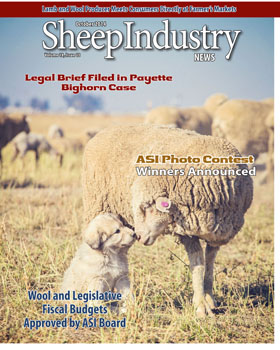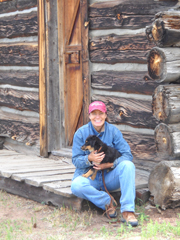
- October 2014
- President’s Notes
- ASI Team Represents Industry in Nanjing
- Belt Buckle Commemorates ASI’s 150th Anniversary
- Colorado Youngster Constructs Lego Camp in Honor of Family Heritage
- Commentary: Recent Headlines Are Example of Public’s Misunderstanding of Protection Dogs
- Dan Wilson: The Best Lamb Marketer is Usually the Person Who Raised the Lamb
- Grazing Allotments, Bighorns Take the Stage at Public Lands Council Meeting
- Market Report
- Nomination Deadline for Annual ASI Awards: Nov. 15
- Opening Brief Focused on Forest Service Payette Errors
- Sheep Budgets for 2014 Approved by Board
- Sheep News in Brief
- Working Together to Make Sheep Better
Recent Headlines Are Example of Public’s Misunderstanding of Protection Dogs
By Bonnie Brown

An Aug. 25 article in the Denver Post “Guard Dogs Continue to Frighten Hikers on High Mountain Trails” has thrust the use of livestock protection dogs on federal lands back into the spotlight.
As to be expected, the article is somewhat inflammatory and inaccurate.
Despite the hysterical tone of some of the individuals that are trying to eliminate the use of livestock protection dogs on federal lands, the sheep industry needs to take this issue very seriously.
I don’t believe the Colorado sheep industry can withstand many more dog bite incidents (regardless of how rarely they occur or who is at fault), and not have some serious repercussions regarding limiting the use of LPDs on grazing allotments.
It is absolutely imperative that producers continue to work on managing their dogs, and not turn out any dogs (on federal grazing allotments) that don’t interact well with people.
ASI’s Recommended Best Management Practices for Livestock Protection Dogs is available on their website www.sheepusa.org
I think the biggest problem with negative encounters between recreationalists and LPDs is the person’s demeanor. To us, LPDs are working dogs that we can holler at and tell them to “get back” and problem solved. My typical encounter, when I have been on various ranches over the years, is a big friendly dog that wants its ears scratched for a couple of minutes, while it checks me out and then returns to the sheep (and yes, I know, I’m not supposed to pet the dogs!).
As farm and ranch folks, we have been around animals all of our lives and instinctively know how to react to any given situation.
The vast majority of recreationalists don’t have that background, so it is reasonable for them to perceive a big, white barking dog as scary or a threat (I don’t think it is reasonable to be hysterical and blow the situation out of proportion and lie about what happens, which is what we are sometimes faced with).
We won’t ever change the minds of radical, unreasonable individuals that simply want to eliminate livestock grazing or be hysterical because an LPD barked at them. We can however, and we must, continue to reach out and educate people about our wondering working dogs.
To that end, Ernie Etchart and I had the most enjoyable encounter with two hikers in Silverton this summer.
On Aug. 18, I went with Ernie to a couple of his sheep camps in the San Juans so I could film some stock footage for us. We stopped in Silverton for a late lunch, and met Paul and Karl, two elderly gentlemen that were hiking the Colorado Trail, and were taking a much needed break in Silverton.
Paul and Karl quickly abandoned their table and joined us so that they could ask Ernie 101 questions about the amazing white dogs they encountered with the sheep. They were enthralled with getting to talk with Ernie and learn about the dogs and sheep. Paul and Karl are both volunteer wilderness rangers for the Forest Service, and belong to a Front Range hiking club that has approximately 500 members. They invited me come to one of their club meetings to talk to hikers about LPDs.
I’m currently trying to make arrangements to do a presentation for them in October.
After all the negativity that we get in the media, it was really nice to get such a warm invitation to come talk about our dogs.
While I don’t entertain any illusions that everyone in their group will offer a warm welcome, it’s a great opportunity to be able to do some targeted public outreach on our behalf.
Bonnie Brown is executive director of the Colorado Wool Growers Association.

